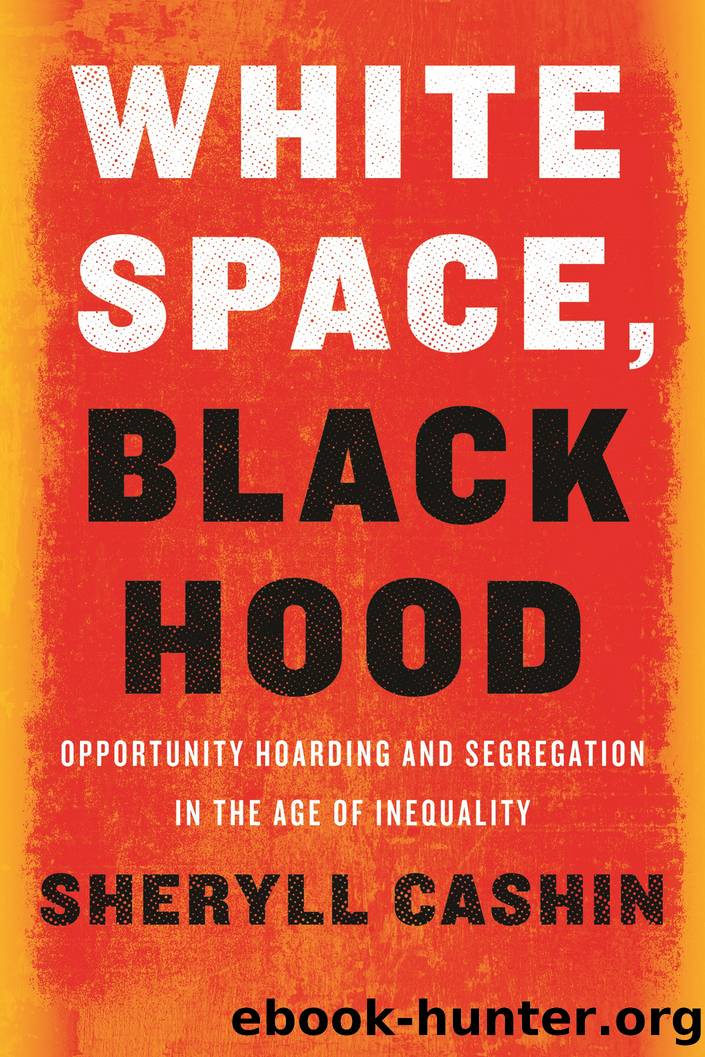White Space, Black Hood by Sheryll Cashin

Author:Sheryll Cashin [Cashin, Sheryll]
Language: eng
Format: epub
Publisher: Beacon Press
Published: 2021-12-15T00:00:00+00:00
REJECTING NARRATIVES OF BLAME AND PATHOLOGY
At this point, some readers are rehearsing well-worn counternarratives that blame descendants for their plight. One can choose not to commit crimes, not to have children you canât raise, not to get high. One can study hard, be an involved parent, reject âthug life,â cooperate with the police, so the arguments go. Such lectures rarely acknowledge the singular segregation that poor Black people are subjected to or the ways in which the state often makes matters worse through punitive, anti-Black public policies and disinvestment. Worse, the righteous critics of descendants in concentrated poverty often engage in racism. Somehow whites who exhibit social pathology get to be individuals, but a Black person who does represents an entire race.35
Meanwhile, nonpoor people typically avoid concentrated disadvantage because they can. Affluent parents pay handsomely to insulate their children from poverty and every conceivable disadvantage. Some parents cheat and bribe to buy their child a place at a selective college rather than trusting their offspring to chart their own destiny.36 It is awfully rich to blame people who canât avoid concentrated poverty for the worse outcomes such environments engender. Such blame assumes that descendants have similar opportunities for social mobility when in fact the state has constructed and maintained a separate and unequal reality for them.
There are many reasons to resist pathologizing descendants in poor neighborhoods. The first is objective evidence that outcomes for poor Black families can change when they are allowed to move from concentrated poverty to higher ground. The Gatreaux court order that enabled residents of public housing to move to higher-income neighborhoods was replicated in a federal demonstration program known as Moving to Opportunity. Recent research demonstrated that children whose families moved when they were young, under age thirteen, significantly improved college attendance and earnings compared to a control group that stayed in a high-poverty environment. When they became adults, their annual incomes were 31 percent higher than those of non-movers. The youth who moved were also likely to live in better neighborhoods as adults.37 Other researchers found that moving to a low-poverty area âgreatly improved the mental health, physical health, and subjective well-being of adults as well as family safety.â38
Admittedly, the Moving to Opportunity experiment did not change economic outcomes for older children or adults, as was the case for adult Gautreaux movers.39 A person long exposed to concentrated poverty and its disadvantages will have a harder time making their way economically than those less exposed. That young children experience greater rewards from moving underscores that environment matters. When Montgomery County, Maryland, enabled Black and Latinx residents of public housing to move to a middle-class neighborhood and attend middle-class school, the children did much better academically than counterparts left behind in high-poverty schools who were given extra resources.40
Likewise, a recent longitudinal study by researchers for the Federal Reserve Bank of Philadelphia found that long-term residents and children who are able to stay in gentrifying neighborhoods benefit as opportunity moves to them and poverty declines. They
Download
This site does not store any files on its server. We only index and link to content provided by other sites. Please contact the content providers to delete copyright contents if any and email us, we'll remove relevant links or contents immediately.
| Africa | Americas |
| Arctic & Antarctica | Asia |
| Australia & Oceania | Europe |
| Middle East | Russia |
| United States | World |
| Ancient Civilizations | Military |
| Historical Study & Educational Resources |
Machine Learning at Scale with H2O by Gregory Keys | David Whiting(4289)
Never by Ken Follett(3930)
Fairy Tale by Stephen King(3365)
Oathbringer (The Stormlight Archive, Book 3) by Brandon Sanderson(3124)
The Man Who Died Twice by Richard Osman(3064)
Will by Will Smith(2904)
Rationality by Steven Pinker(2348)
Can't Hurt Me: Master Your Mind and Defy the Odds - Clean Edition by David Goggins(2319)
The Dark Hours by Michael Connelly(2299)
Friends, Lovers, and the Big Terrible Thing by Matthew Perry(2211)
The Dawn of Everything: A New History of Humanity by David Graeber & David Wengrow(2186)
Principles for Dealing With the Changing World Order: Why Nations Succeed and Fail by Ray Dalio(2031)
A Short History of War by Jeremy Black(1835)
HBR's 10 Must Reads 2022 by Harvard Business Review(1832)
Go Tell the Bees That I Am Gone by Diana Gabaldon(1746)
A Game of Thrones (The Illustrated Edition) by George R. R. Martin(1707)
Kingdom of Ash by Maas Sarah J(1661)
515945210 by Unknown(1660)
443319537 by Unknown(1542)
